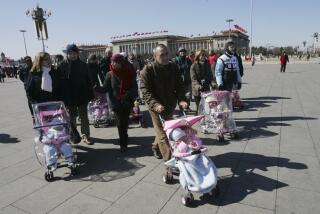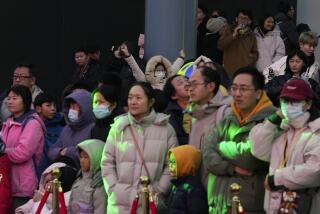Population : China Applies Family Limits to Minorities
- Share via
URUMQI, China — This nation’s population-control policies, which have produced sharply lowered birth rates during the past decade, are now being applied with growing strictness to previously exempt minorities.
The toughening of family planning rules has come gradually over the past few years. Here in China’s western region of Xinjiang, minority couples in urban areas are now allowed up to two children. Those in the countryside may have three or four.
This is less Draconian than rules for ethnic Chinese. Urban Chinese nationwide are generally limited to one child, while peasant couples whose first baby is a girl can often get permission to have a second. Most couples want at least one son, partly because sons traditionally hold greater responsibility for caring for elderly parents.
Zaidinjyan, a Uighur construction worker in Xinjiang’s capital of Urumqi, considers himself lucky to be the father of two boys, ages 3 and 2. He and his wife do not intend to have any more children, he said.
“If you exceed the limit, you face a 50% wage cut for one year, plus a 2,000 yuan ($385) fine,” Zaidinjyan said. “But some couples with two girls are willing to pay.”
The new restrictions, which Zaidinjyan said have been enforced at his workplace since last year, are part of an effort to further rein in China’s population growth. The tightening also carries profound implications for relations between minorities and ethnic Chinese.
Birthrates in China dropped from 34 per thousand in 1970 to 21 per thousand in 1989, resulting in 200 million fewer births than would have been the case without the population-control campaign, according to officials.
But results of a census conducted in July and released late last month showed China’s population at 1.134 billion, about 20 million more than officials had expected. The annual growth rate, which ran at 1.47% in the year ended June 30, is still considered disturbingly high.
The census also showed that between 1982 and July of this year, China’s minority population rose to 91 million from 67 million, an increase of 36%. During the same period, the ethnic Chinese population grew by 102 million, an increase of 11%.
China’s 55 officially recognized ethnic minorities now make up 8% of the country’s population, up from 6.6% in 1982. Their traditional homelands, which mostly lie in vast but sparsely populated border regions, make up about 60% of China’s territory.
Over the past 40 years, despite minority population growth, migration from the main part of China has led to increasing ethnic Chinese domination of minority homelands. This is an important strategic goal of the Beijing government aimed both at exploiting natural resources and ensuring that border regions do not break loose from central control.
But Chinese domination also provokes resentment, and the new birth-control rules threaten to further inflame tensions. Despite relatively rapid population growth, many minorities see their traditional culture withering because of assimilation and the influx of Chinese migrants.
“They’re trying to get rid of us,” insisted an angry Uighur woman from Urumqi. “First they limited us to three children, and now two.”
Central authorities say that forced abortions are not part of China’s population policy. But women who become pregnant in violation of family planning rules commonly face extremely heavy pressure to have abortions. These pressures, long familiar to ethnic Chinese, now extend to minority couples.
At the Benefit the Masses Leather Factory in Yining, a largely Uighur town located in Xinjiang not far from the Soviet Border, rules limiting couples to two children, or in “special circumstances” three, have been enforced since 1987, according to Baktie, a Uighur man who is the factory’s Communist Party secretary.
He refused, however, to discuss what fines or other punishments are faced by women who exceed the limit.
The factory has 1,200 employees, of whom 46% are women, yet in three years there has not been a single unapproved birth, Baktie said.
“No one exceeds the limit, so there’s been no need to fine anyone,” he said.
More to Read
Sign up for Essential California
The most important California stories and recommendations in your inbox every morning.
You may occasionally receive promotional content from the Los Angeles Times.













